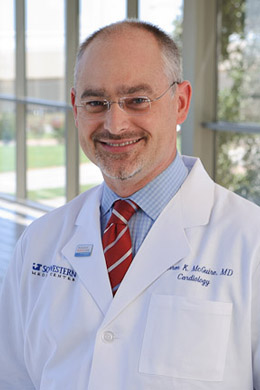
Chemistry major
Received the Hendrix Odyssey Medal in Research in 2008
Professor of Internal Medicine at the University of Texas Southwestern Medical Center at Dallas; Clinical Cardiology, Dallas Heart Ball Chair for Research on Heart Disease in Women and Director of the Parkland Hospital and Health System Outpatient Cardiology clinics. The University of Texas System Board of Regents Outstanding Teaching Award in 2013. Associate of the Donald W. Reynolds Cardiovascular Clinical Research Center, and Director of the Parkland Hospital and Health System Outpatient Cardiology clinics. Recipient of Hendrix Odyssey Medal for Research, 2008-2009.
Dr. McGuire earned his medical degree from the Johns Hopkins University School of Medicine in 1993, completed internal medicine residency at the University of Texas Southwestern Medical Center in 1996 and cardiology fellowship at Duke University in 2001.
Highlight quote
"Figure out where your passions lie and make every effort to work your education and career in concert"
Current projects
Dr. McGuire's main clinical and research interests are in the long-term prevention of and risk-modification for cardiovascular disease, especially among the population of patients with diabetes. He is actively involved in studying the effects of a number of therapeutic intervention strategies among patients with diabetes and cardiovascular disease. He is senior editor of Diabetes and Vascular Disease Research, associate editor of the American Heart Journal , a Fellow of the American Heart Association and the American College of Cardiology, past Chair of the AHA Diabetes Committee, Steering Committee for the US Diabetes Collaborative Registry, member of the American Heart Association Statistics Committee, member of the FDA Cardiovascular and Renal Drugs Advisory Committee, and a former member and now ad hoc consultant of the FDA Cardiovascular and Renal Drugs Advisory Committee. He is actively involved in studying the effects of a number of therapeutic intervention strategies among patients with diabetes and cardiovascular disease, involved in a leadership role for 14 international cardiovascular outcomes trials evaluating drugs for diabetes, high cholesterol, and obesity.
Undergraduate Research
During the summer between sophomore and junior years at Hendrix, on a National Science Foundation Grant, I worked in the lab of Dr. John Hogg at Texas A&M University, developing a micro-scale organic synthesis of a C13 –labeled metabolic substrate of a key digestive enzyme, a-chymotrypsin. This was fed to mice and the metabolic pathways were spatially tracked using magnetic resonance spectroscopy, the forerunner of magnetic resonance imaging commonly used in clinical practice today.
During the following summer and extending through my senior year, I split time between the lab of Dr. Randall Kopper on campus and Dr. Charles Liarakis at the University of Arkansas Medical Sciences campus in Little Rock. This work focused on determination of the secondary structure of hen ovalbumin (i.e. the protein in "egg white") messenger RNA, the most efficiently translated protein across all vertebrate species.
How Hendrix prepared me for success
The didactics and the culture at Hendrix fostered development of scientific curiosity, encouraged healthy academic skepticism, and developed quantitative methods forming the underpinning that I have ultimately applied in the design and analysis of rigorous studies. The experience also encouraged autonomy but in supportive framework, allowed realization of academic success by facilitating scientific presentation and publication, and among the most important of lessons learned, by example the faculty demonstrated how scientific investigation can be fun.
Future plans
I plan to continue on my present path/trajectory, with continued focus on
- teaching in the clinical and research arenas
- participation in international clinical research collaborations for the development of therapies for improving cardiovascular outcomes, especially among patients with diabetes;
- continued administrative work locally in the oversight of human investigation to ensure rigor of study design and execution and to ensure compliance with ethical regulation
- continued work with the U.S. FDA in the review and regulation of new drugs for the treatment of heart and kidney diseases.
My advice
Read at least 1 newspaper daily, and regularly read for fun. As early as possible, figure out where your passions lie and make every effort to work your education and career in concert; doing what you love for a living is a real privilege for those who can manage it.